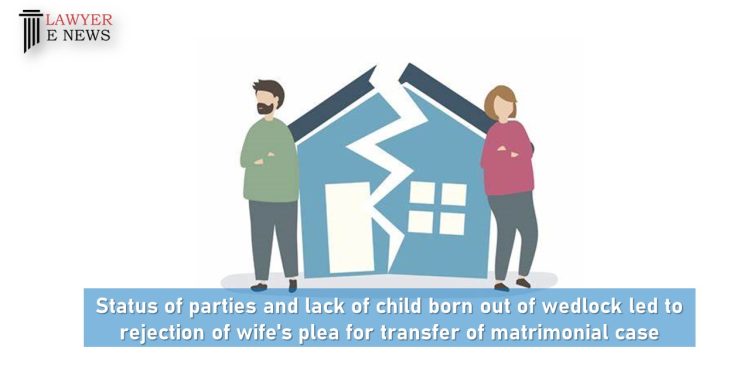Status of parties and lack of child born out of wedlock led to rejection of wife’s plea for transfer of matrimonial case: Supreme Court

On 18 April 2023 , In a recent judgment by the Supreme Court of India, in case title DELMA LUBNA COELHO Vs EDMOND CLINT FERNANDES, the Court dismissed a petition seeking transfer of matrimonial proceedings from Mangaluru, Karnataka to Mumbai, Maharashtra. The petitioner, a permanent resident of Canada, had filed the transfer petition on the grounds that she was facing difficulties in travelling to Mangaluru for the court hearings, which was over 1,000 km away from Mumbai. However, the Court observed that no case was made out for transfer of the petition, considering the status of the parties and the fact that both the petitioner and respondent were well-educated and engaged in their own jobs and professions.
The petitioner and respondent had met on Facebook in December 2019 and got married on 5 December 2020 in Mangaluru as per Christian rites and customs. The petitioner alleged that she was ill-treated, insulted and humiliated by the respondent and his family members at her matrimonial home in Mangaluru. She was accused of each and everything and offensive language was used against her. The respondent booked a one-way ticket for the petitioner and sent her to Mumbai on 15 January 2021, after which he disconnected all relations with her. On 5 July 2021, the petitioner came back to Mangaluru, but she was denied entry in her matrimonial home by the respondent and his family members, leading to her lodging a complaint at the Police Station in Pandeshwar, Mangaluru.
The respondent stated that he had already issued a divorce notice, and his petition seeking divorce was in the process of filing. The petitioner replied to the legal notice on 6 August 2021, stating that she was ready and willing to come to her matrimonial house and wanted to live a happy married life. On 10 August 2021, she received summons of the Court along with a copy of the divorce petition filed in the Family Court at Mangaluru. The petitioner submitted that she was living with her old aged parents at Mumbai, and there was no one at her home to accompany her from Mumbai to Mangaluru to contest the petition, which was more than 1,000 km from Mumbai. She did not even know Kannada language. Whereas, the respondent would not face any problem in case the petition is transferred to Mumbai (Maharashtra).
The Court observed that the parties had lived together only for 40 days and that it takes time to settle down in a marriage. It also noted that the judgments relied upon by the learned counsel for the respondent were distinguishable as in those cases, the proceedings had travelled up to the Supreme Court after decision by the Courts below in divorce proceedings, where the parties had led evidence in old matrimonial disputes. There was sufficient material on record, and the ground on which the marriage was dissolved in exercise of power under Article 142 of the Constitution of India was irretrievable breakdown of marriage, which otherwise is not a ground in the Hindu Marriage Act, 1955, for dissolution of marriage.
The Court also noted that a number of Transfer Petitions are filed in matrimonial cases, primarily by the wives seeking transfer of the matrimonial proceedings initiated by the husband. This Court normally has been accepting the prayer made while showing leniency towards ladies. However, in the present case, the petitioner was a permanent resident of Canada, and there was no child born out of the wedlock. Considering the status of the parties and the fact that it was a petition filed by the wife seeking transfer of a case filed by the husband, in the Court’s view, no case was made out for transfer of the petition from Mangaluru, Karnataka to Mumbai, Maharashtra.
The Court also observed that it did not find this to be a fit case for the exercise of power under Article 142 of the Constitution of India.
DELMA LUBNA COELHO Vs EDMOND CLINT FERNANDES






